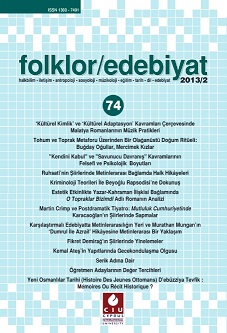Ruhsatî’nin Şiirlerinde Metinlerarasi Bağlamda Halk Hikâyeleri
Folk Stories from the Point of Intertextuality in Ruhsatî’s Poems
Author(s): Kadriye TürkanSubject(s): Customs / Folklore, Poetry, Turkish Literature, Philosophy of Language
Published by: Uluslararası Kıbrıs Üniversitesi
Keywords: Ruhsatî; intertextuality; folk poems; folk stories; allusion;
Summary/Abstract: No texts can be evaluated without the impact from the previous ones. Every text is relevant to the others directly or indirectly. Artists, writers and poets are affected by the other works consciously or unconsciously and they work them from the different points of view. In this way, they give the opportunity of intertextuality and give the opportunity of pleasure to the readers who have a certain knowledge. Intertextuality that is occured in the 20th century takes place in all the branches of arts, especially in literature and popular culture. Oral culture with its infinite materials has always affected the written culture. One of the fields we observe the intertextuality is the folk literature. Because the folk poems are the part of it, we should study the folk poems from the point of intertextuality. Rusatî the most distinguished representative of the 19th century folk poems, has poems over 400. He tells a lot of elements such as “love, nature, homesick, advice, satire, complaint, mysticism” in these poem. While he is working these components, he considers these elements from the point of intertextuality. Love is the main theme in Ruhsatî’s poems. While he is working these themes, he often mentions the famous folk storys in “love” is the main theme such as “Kerem and Aslı, Ferhat and Şirin, Leyla and Mecnun, Arzu and Kamber, Yusuf and Züleyha.” This is the indicator of “a text in a text” concretely from the point of intertextuality. “Allusion” is a term that is seen especially in poems. It makes a reference indirectly to famous people, folk stories, legends, verses of the Koran and hadiths. In the text, the poems of Aşık Ruhsatî will be evaluated from the point of intertextuality in which allusion is the based.
Journal: Folklor/Edebiyat
- Issue Year: 19/2013
- Issue No: 74
- Page Range: 73-84
- Page Count: 12
- Language: Turkish

